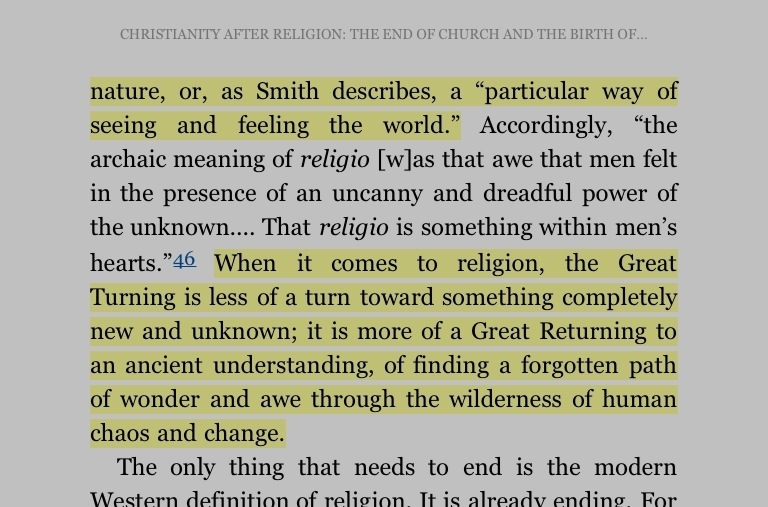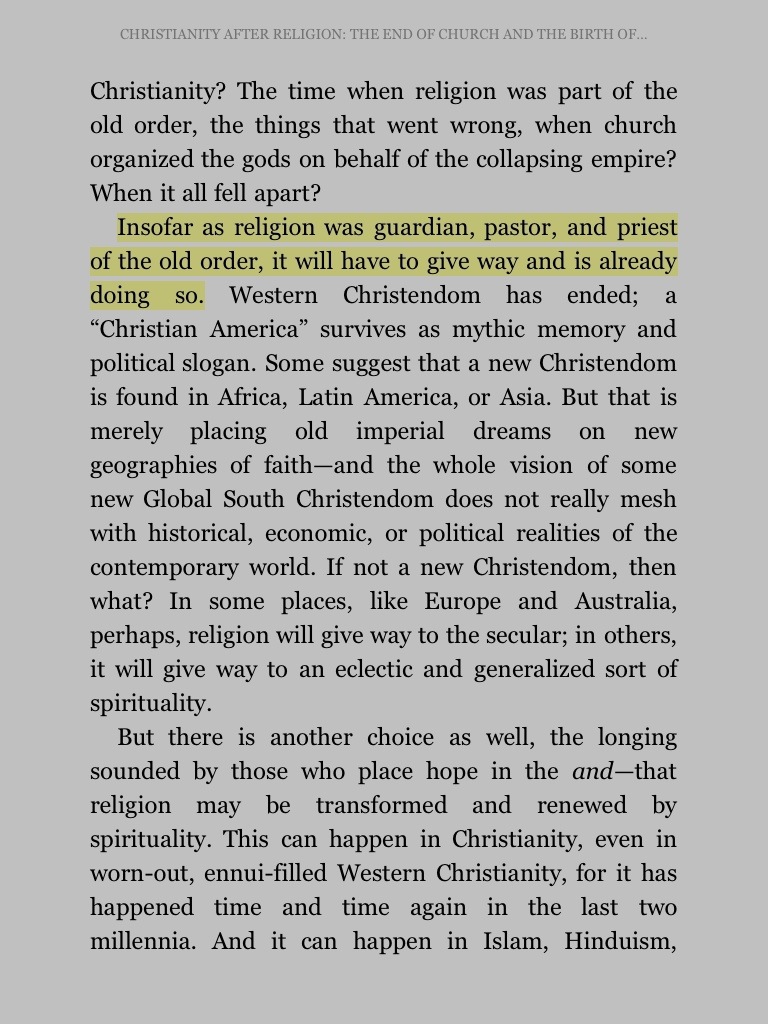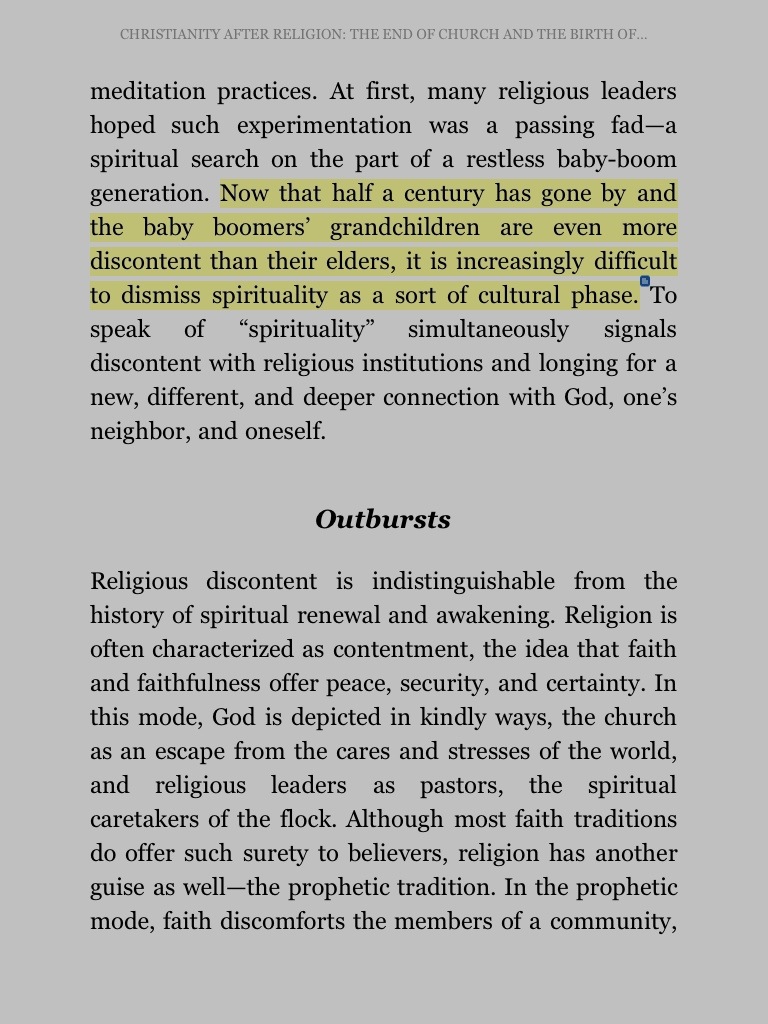Is it “through the human wilderness of chaos and change,” or is it through a socially and historically specific kind of chaos and change, whose specificity needs to inform our response? Diane Butler-Bass is correct in noting that a more archaic strata of religio may point the way through, but then our challenge is to differentiate what is emancipatory in this archaic strata from what was and remains genuinely oppressive. Religio remains emancipatory because it arose within a world in which the spirit had not yet pulled free from its bodily form of appearance and in which, therefore, the material sign was still viewed and experienced as inseparable from the divine body it revealed. Understanding why this spirit pulled free from its body (and why this body became dispirited) might therefore prove indispensable in our attempt to differentiate emancipatory from oppressive religion. Here is where Diane Butler-Bass would benefit from a more rigorous critique of the capitalist social formation, whose principle social form, the commodity, is notable precisely in that it drives a wall between the wholly abstract value form and it’s material form of appearance. The Great Transformation will not take place unless and until we cultivate a form of social relations and mediations that restore the body of religion.
Month: July 2012
Diane Butler-Bass’ transcendental critique
Diane Butler-Bass adopts the vantage-point of the “spiritual” in what she wishes to be a critique of the contemporary world order, but fails to recognize that the “spiritual” arises from, reinforces, and reproduces that order. A more adequate critique would have to recognize the more than merely oppositional relationship between the spiritual and the religious; the mutually constitutive, formative relationship that each bears to the other.
Christianity after Religion
Yes, religious leaders who viewed spirituality as a fad were (partly) mistaken. But few religious sociologists have the patience or perspective necessary to appreciate how this 500 yr. separation from the body of religion brought on by capitalism is toxic in all it’s phases, whether traditional, modern (Fordist) or Post-modern (post-Fordist).
Chicago School supports Nationalization of Banks?
http://www.nytimes.com/2012/07/23/opinion/banks-that-are-too-big-to-regulate-should-be-nationalized.html
“Of course, it would probably take another financial meltdown to make banking nationalization politically tenable.” The political has always been the nemesis of Chicago School economists. If only we could get politicians to behave more economically rational. Yes? Well, no. Because the economy is supposed to be subordinate to the social and the political. Tragically, Alperovitz uncomprehendingly rehearses the Chicago School’s time-honored refrain about loop-holes, with absolutely zero recognition that when politicians run using corporate donations, they are obligated to build a tax code that rewards their patrons. More to the point, however, time and again v Hayek and Milty emphasized that because monopolies were subject to the price mechanism, they were preferable to nationalized or socialized industries. (People will not pay a price above what they can afford; manufacturers will not manufacture a product they cannot afford to sell, monopoly or no monopoly.) Simons and Knight, in extremis, despaired over the market mechanism and opted for nationalization, because, in their view, it was preferable to socialization.
The (Anti-)Republicans’ $3 Million Weekend in the Hamptons – NYTimes.com
The Republicans’ $3 Million Weekend in the Hamptons – NYTimes.com
Yes, I know. The Republican Party has always been the party of wealth. That’s neither new nor news. Yet, there was a time not long ago when Republicans prided themselves of vigorous support, expansion, and defense of . . . well . . . res publica; the wealth we share in common. And that has changed, big time.
But, before we begin dumping on our Constitutionally brain-dead Supreme Court and its decision to officially and legally endorse our nation’s time-honored plutocracy, consider for one moment that the highest court merely made official a practice that was at least as old as the 1790s, when nearly all of the then thirteen states vastly expanded voting rights to include white men with neither education, nor wealth, nor property. Up until that time the healthy, wealthy, and wise were, for the most part, voting for one another. After the voting rights revolution of the 1790s, wealth had to convince non-wealth that its interests were best served by voting for wealth. And, for the most part, save for some real nail-biters in the 1890s and 1930s, the wealthy have been successful year after year convincing the non-wealthy to return the wealthy to office.
Yet—and this is my point—until recently Republicans had argued that they deserved our vote because they would make sure that republican institutions and values would be preserved; meaning, of course, the expansion of the wealth we share in common, the commonwealth, i.e., res publica. And, so, decade after decade, Republicans supported public institutions: public libraries, public schools, public parks, even public utilities and public health. To be sure, they also opposed organized labor, opposed cheap capital, and opposed internationalism. They opposed those things that granted power to those who did not already enjoy good health, education, and welfare. But this did not make them opponents of common, public wealth per se.
Today, by contrast, Republicans, ironically, are constitutionally opposed to expanding and protecting the wealth we hold in common, res publica, which, of course, is the very essence of their political ideal. Instead, they have become champions of private wealth and private self-interest; which, ironically, is the very opposite of republicanism.
But the biggest irony of all is that, according to recent polls, half of the public of res publica is just as eager today as it was in the 1790s to hand their economic and political fortunes over to the wealth that wishes to deprive them of their economic and social citizenship. The Republican Party is loudly campaigning on a platform of oikonomia—private wealth, private power—instead of on a platform of res publica, which ought to be, and once was, the very foundation of their party.
So $3M here, $3M there. The tragedy is that non-wealth is just as ready today as it was in the 1790s to believe that the wealth of others will protect them. And so, Republicans feel confident that voters will vote for those who wish, openly, to deprive them of their means for political enfranchisement.
Same as it ever was.



